
 i_need_contribute
i_need_contribute

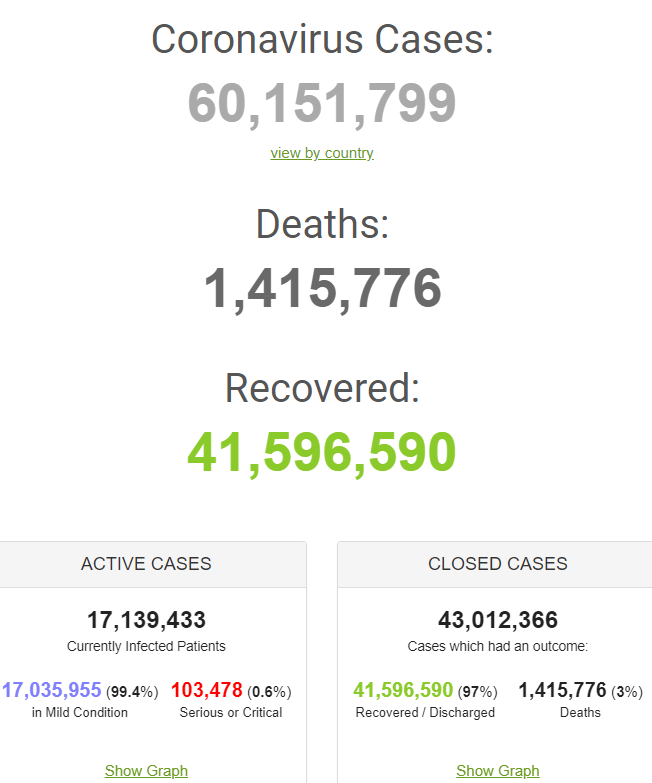
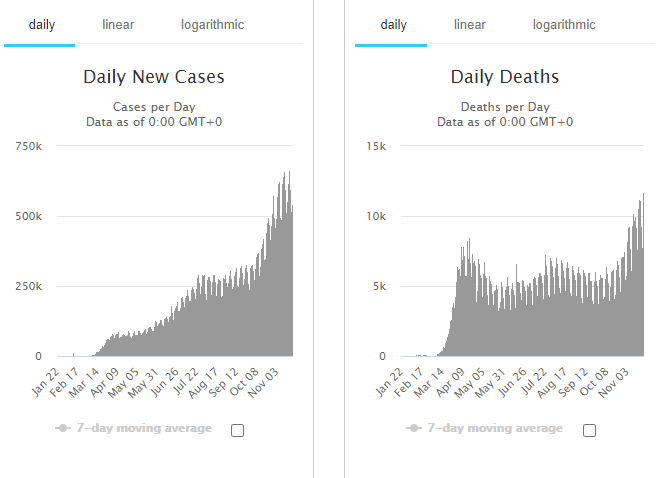
|
Country, |
Total |
New |
Total |
|
World |
60,088,594 |
+543,364 |
1,413,799 |
|
12,955,145 |
+175,168 |
265,898 |
|
|
9,221,998 |
+44,276 |
134,743 |
|
|
6,121,449 |
+33,445 |
170,179 |
|
|
2,153,815 |
+9,155 |
50,237 |
|
|
2,138,828 |
+24,326 |
37,031 |
|
|
1,614,126 |
+7,221 |
43,668 |
|
|
1,538,794 |
+11,299 |
55,838 |
|
|
1,455,022 |
+23,232 |
51,306 |
|
|
1,381,795 |
+7,164 |
37,432 |
|
|
1,262,494 |
+7,515 |
35,677 |
|
|
1,049,358 |
+7,483 |
101,926 |
|
|
962,906 |
+16,258 |
14,965 |
|
|
952,439 |
+1,882 |
35,685 |
|
|
909,066 |
+10,139 |
14,314 |
|
|
880,542 |
+13,721 |
45,738 |
|
|
772,252 |
+2,493 |
21,083 |
|
|
647,976 |
+12,287 |
11,263 |
|
|
559,902 |
+1,123 |
15,755 |
|
|
543,087 |
+1,007 |
15,131 |
|
|
539,749 |
+2,292 |
12,031 |
|
|
506,302 |
+4,192 |
16,111 |
|
|
502,534 |
+5,896 |
7,499 |
|
|
493,744 |
+3,926 |
9,035 |
|
|
460,916 |
+7,381 |
12,672 |
|
|
451,990 |
+2,230 |
6,448 |
|
|
430,605 |
+7,753 |
10,373 |
|
|
421,713 |
+1,109 |
8,184 |
|
|
379,883 |
+2,954 |
7,744 |
|
|
355,741 |
+252 |
5,811 |
|
|
342,444 |
+4,889 |
11,618 |
|
|
331,527 |
+3,999 |
5,469 |
|
|
330,935 |
+937 |
2,822 |
|
|
268,721 |
+3,919 |
4,056 |
|
|
254,710 |
+4,377 |
2,577 |
|
|
224,078 |
+1,790 |
1,361 |
|
|
192,996 |
+4,586 |
2,380 |
|
|
186,436 |
+492 |
13,264 |
|
|
181,881 |
+3,929 |
4,008 |
|
|
161,365 |
+1,310 |
559 |
|
|
156,930 |
+1,272 |
2,986 |
|
|
144,034 |
+56 |
8,916 |
|
|
140,795 |
+402 |
870 |
|
|
Dominican |
139,111 |
+282 |
2,313 |
|
137,642 |
+227 |
236 |
|
|
133,929 |
+1,571 |
1,989 |
|
|
133,190 |
+895 |
1,662 |
|
|
133,029 |
+6,842 |
1,274 |
|
|
129,348 |
+4,382 |
3,226 |
|
|
127,522 |
+813 |
2,002 |
|
|
126,953 |
+1,471 |
1,112 |
|
|
126,860 |
+678 |
1,945 |
|
|
122,579 |
+223 |
1,391 |
|
|
119,349 |
+627 |
4,099 |
|
|
118,705 |
+1,188 |
934 |
|
|
113,742 |
+361 |
6,573 |
|
|
111,818 |
+3,128 |
1,051 |
|
|
108,014 |
+2,323 |
1,445 |
|
|
106,591 |
+388 |
1,661 |
|
|
105,211 |
+296 |
2,869 |
|
|
100,498 |
+355 |
876 |
|
|
99,633 |
+1,215 |
2,188 |
|
|
98,927 |
+3,646 |
1,194 |
|
|
97,493 |
+1,021 |
709 |
|
|
95,137 |
+2,131 |
1,815 |
|
|
90,213 |
+1,017 |
2,935 |
|
|
86,464 |
+22 |
4,634 |
|
|
86,016 |
+130 |
340 |
|
|
82,236 |
+1,731 |
1,784 |
|
|
79,180 |
+707 |
1,110 |
|
|
78,512 |
+727 |
1,409 |
|
|
77,891 |
+819 |
1,677 |
|
|
77,000 |
+1,133 |
2,309 |
|
|
75,007 |
+1,811 |
656 |
|
|
73,021 |
+1,367 |
797 |
|
|
71,985 |
+211 |
604 |
|
|
70,930 |
+219 |
2,028 |
|
|
70,366 |
+481 |
1,241 |
|
|
67,080 |
+1,302 |
1,156 |
|
|
66,607 |
+168 |
1,169 |
|
|
58,847 |
+2,188 |
341 |
|
|
58,183 |
+18 |
28 |
|
|
56,164 |
+1,037 |
1,561 |
|
|
51,184 |
+243 |
323 |
|
|
49,393 |
+1,169 |
409 |
|
|
37,884 |
+165 |
1,086 |
|
|
34,300 |
+744 |
735 |
|
|
33,717 |
+534 |
314 |
|
|
32,188 |
+570 |
450 |
|
|
31,484 |
+373 |
283 |
|
|
31,353 |
+349 |
510 |
|
|
27,849 |
+14 |
907 |
|
|
9,199 |
+252 |
46 |
|
|
5,300 |
+3 |
117 |
|
|
4,751 |
+14 |
45 |
|
|
3,922 |
+2 |
60 |
|
|
1,316 |
+4 |
35 |
Retrieved from: https://www.worldometers.info/coronavirus/
From CNN's Fred Pletigen in Berlin
Germany recorded 410 deaths related to coronavirus in the past 24 hours -- the highest one-day jump in fatalities since the outbreak began, the Robert Koch Institute (RKI), the country's disease and control agency, said on Wednesday.
It was the first time more than 400 Covid-19 deaths were recorded in Germany in a single day, as the country grapples with a recent surge in new coronavirus cases. A total of 18,633 new infections were registered in the past 24 hours, according to RKI.
German Chancellor Angela Merkel is set to meet state governors on Wednesday to decide on new measures to try and get the surge of infections under control.
Among the measures up for debate is an extension of the current lighter restrictions until the end of December, additional mask mandates for schools, and further limits on the amount of contacts people are allowed to have both in public and private.
From CNN's Maggie Fox
The US government’s Operation Warp Speed effort is trying to understand discrepancies in data coming out of trials of AstraZeneca’s experimental coronavirus vaccine, Moncef Slaoui, chief science adviser to the mission, said Tuesday.
It might be possible to adjust the US trial arm if it turns out a different dose of the vaccine works better, he said.
AstraZeneca said Phase 3 trial data from testing in Britain and Brazil indicated the vaccine was 62% effective -- except for a batch tested in 3,000 volunteers that looked to be 90% effective in preventing infection. The vaccine, developed with the University of Oxford, is also being tested in the US but there’s no data from that arm of the trial yet.
“We are, of course, also reviewing in depth with the AstraZeneca and Oxford teams all the specifics of the data generated to understand what difference there is between a schedule that gives a 62% efficacy and one that gives 90% efficacy,” Slaoui told an Operation Warp Speed briefing Tuesday.
AstraZeneca said surprisingly, the stronger effects were seen in volunteers who got a half dose of the vaccine, boosted by a full dose a month later. The 62% efficacy was seen in the majority of volunteers who got the proper dosing for both shots.
“We have been made aware of what's called now the half dose at the time it happened, was a change in the way the quantity of vaccine put in a vial was tested,” Slaoui said.
He seemed to indicate the half dose was given by mistake. “And when they realized there was an error or change in the approach, technique used, they corrected it. In the meantime, about 3,000 subjects were recruited, half in the placebo and half in the vaccine group.”
That would skew the results. Clinical trials are carefully designed, and results that came from mistakes usually are not included in the final reports of those trials. But clinical trials can be adjusted if mistakes show a different dosing regimen, for instance, can provide better outcomes.
“What we're now looking to analyze is what immune response has been induced in those who have received the half dose and the full dose versus those that have received twice the full dose and understand whether there are differences in the immune response induced,” Slaoui added.
Retrieved from: https://edition.cnn.com/world/live-news/coronavirus-pandemic-11-25-20-intl/index.html
Ollie Williams
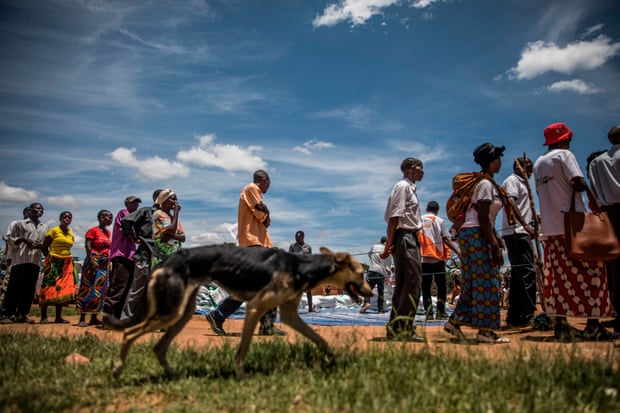
People await for food to be distributed by the World Food Programme and World Vision in Simumbwe, Zambia, on 22 January.
Zambia has become the first African country to default on its debts since the pandemic, leading to fears that a “debt tsunami” could engulf the continent’s most heavily indebted nations as the financial impact of coronavirus hits.
A hastily-arranged G20 finance minister meeting in Saudi Arabia failed to sort out Zambia’s debt, after the southern African country missed a $42.5m (£32m) coupon payment on its bonds in October. Missing another payment on 14 November meant a technical default.
Zambia’s finance minister, Bwalya Ng’andu, was quick to blame the banks and asset and fund managers who wanted to see more transparency over an estimated $3bn debt to China, but who refused to sign the necessary confidentiality agreements, he said.
Ng’andu said on state television, “The position of the Chinese banks is: ‘You’re not going to give anybody any information without the confidentiality agreements in place’.”
The Zambia External Bondholder Committee, a consortium of lenders that own 40% of Zambia’s outstanding Eurobonds, said in a statement they had had no direct discussions with authorities. As a result, the “lack of engagement and transparency does not provide for the conditions that would otherwise allow bondholders to consider providing near-term relief”, they said.
Other organisations, including the International Monetary Fund (IMF) and World Bank, have said Zambia has taken on more debt than it could handle. Even before the pandemic, Zambia was due to pay $1.7bn to service its debts this year – equating to more than 8% of the country’s GDP for 2020.
But coronavirus plays a key role in the recent default. As financiers negotiate with finance ministers over repayment terms, the virus is depleting Zambia’s already fragile healthcare resources.
“As I speak it’s raining outside,” said Eneya Maseko, a programme manager for Oxfam in Zambia, who said the arrival of the wet or rainy season would bring additional challenges like cholera and potentially a second wave of Covid-19. So far Zambia has recorded almost 18,000 cases of the virus.
“This era we’re in comes with serious health challenges. We need healthcare providers to have some level of preparedness,” Maseko said.
But the Zambian government is now debating a budget that would see less money spent on healthcare and more on servicing debt repayments.
“It is simply immoral for bondholders to demand full repayment and to make huge profits on Zambia’s debt while the country struggles with Covid-19, a major economic crisis and spiralling poverty levels,” said Sarah-Jayne Clifton, director of the Jubilee Debt Campaign, which estimated that some financial institutions will make a 250% profit on their Zambian bonds.
Neighbouring governments are rattled: if Zambia has had to default, they could too.
“Ghana looks very risky to me,” said Tim Jones, head of policy at the Jubilee Debt Campaign. He said Angola, Chad and Congo-Brazzaville were also at risk.
A separate study by the Institute of International Finance warned of a “debt tsunami” as global indebtedness topped $277tn in the third quarter of this year. In emerging markets, which are more likely to default, debt has risen by more than a quarter.
This potential wave of defaults could have catastrophic effects on already fragile healthcare systems, aid agencies warned.
“At a time when hospitals and healthcare systems are buckling under the strain of Covid-19, it is perverse that poor countries are having to pay $3bn a month in debt repayments to rich banks, investment funds or the World Bank, while their populations fall further into poverty and destitution,” said Chema Vera, Oxfam International’s interim executive director. “Debt needs to be cancelled, postponing it is futile.”
“The UN security council could pass a resolution to compel private creditors to accept a debt restructuring,” said Jones, who argued that private lenders are proving the hardest to negotiate with when it comes to debt restructuring deals.
The terms of Zambia’s default will be negotiated next month when the IMF visits the country to discuss a potential $1.3bn loan. These terms could provide a template for other countries that are on the verge of default.
“For the ordinary Zambian those things they require to live a decent life and be in good health will be very difficult to expect from government,” said Maseko. “I am really struggling to think of a worse case scenario.”
Retrieved from: https://www.nytimes.com/live/2020/11/23/world/covid-19-coronavirus/pakistan-pauses-in-person-learning-until-january-2021
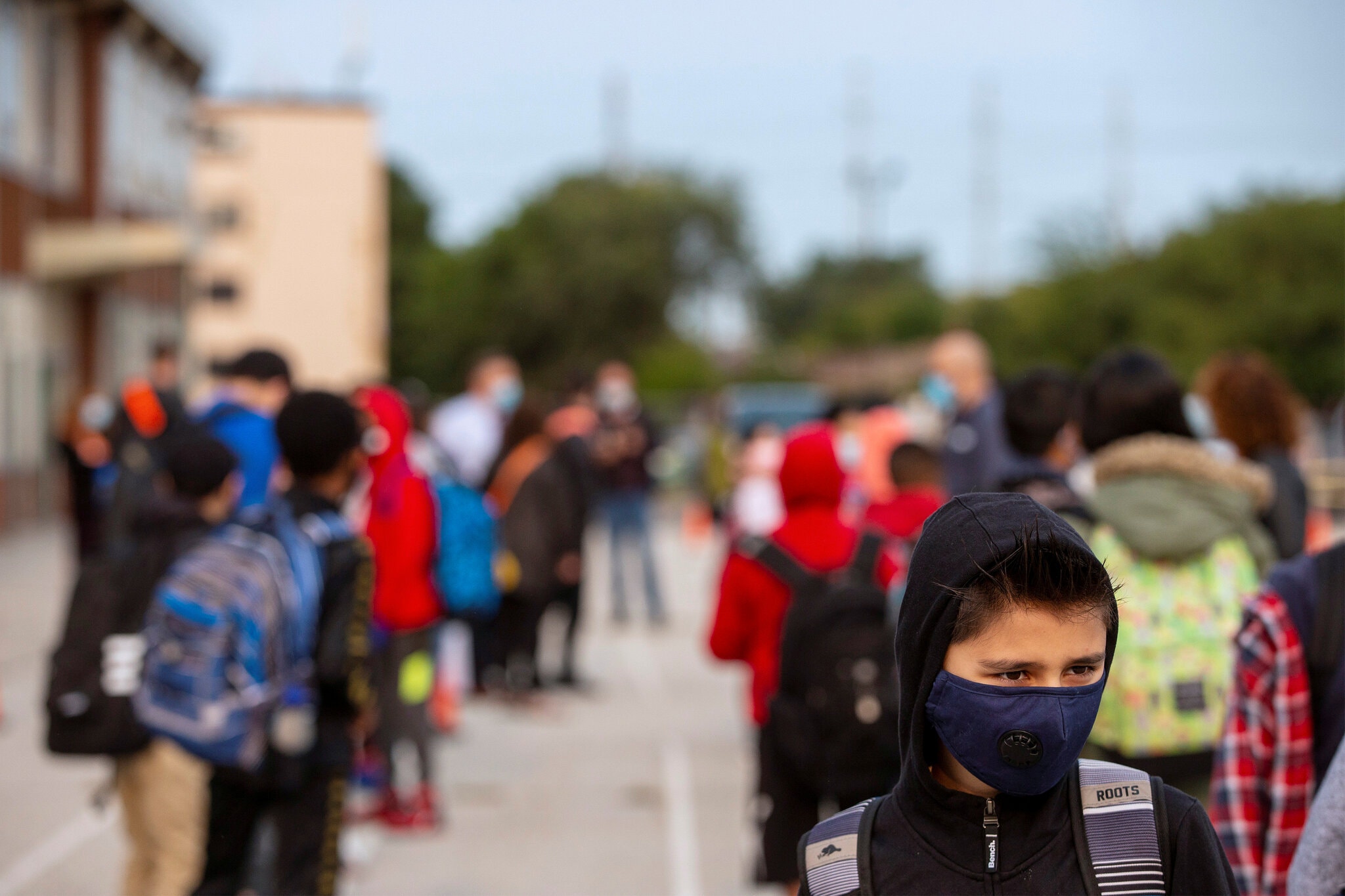
Students at a school in Scarborough, outside Toronto, in September. Despite Toronto’s new coronavirus restrictions, in-person classes will continue
Toronto, the fourth largest city in North America, went into lockdown on Monday. But in contrast to New York and other big American cities, officials are finding it more beneficial to keep schools open.
“We cannot put in-class learning at risk,” Ontario’s premier, Doug Ford, said last week. Along with trying to avoid overwhelming hospitals and protecting older adults in long-term care homes, Mr. Ford said, educating students was “what matters most.”
Mr. Ford’s announcement illustrated how Canada has followed the lead of much of Europe, prioritizing the opening or reopening of schools, while just across the border, many U.S. states have focused on keeping businesses open.
In most places, there are no official thresholds for shutting schools down and there is little appetite to do so, according to Ahmed Al-Jaishi, an epidemiologist who is part of an academic team compiling school outbreaks across Canada. And, despite fears among parents that students would bring the disease home and among teachers that they would get infected, such outcomes have been rare.
Even so, some parents in Toronto have been reluctant to allow their children to return to in-class learning, particularly now, with the city seeing its biggest surge in coronavirus cases since the start of the pandemic. Last week, the city reported a 6.2 percent positive test rate. That is more than double the 3 percent positive test rate in New York that triggered school shutdowns last week.
Most schools across Canada shut in March, when Prime Minister Justin Trudeau asked Canadians to stay home and closed the border. In many cases, the schools didn’t reopen until September, after months of parental complaints, children falling behind in schoolwork and rising concerns about the effects of social isolation.
Retrieved from: https://www.nytimes.com/live/2020/11/24/world/covid-19-coronavirus/in-canadas-second-lockdown-schools-remain-open
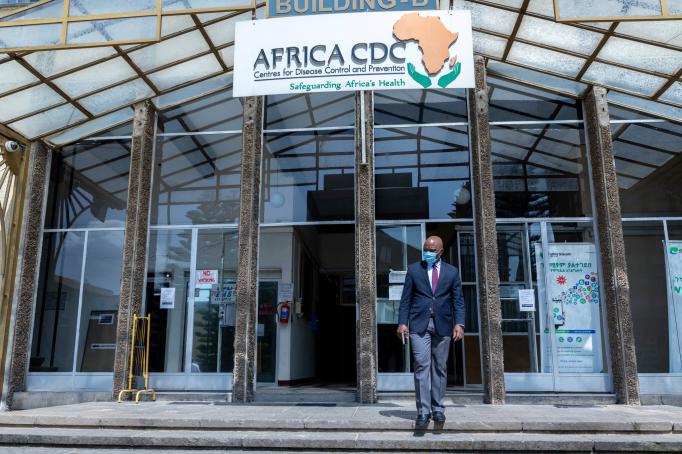
Dr. John Nkengasong, the director of the Africa Centres for Disease Control and Prevention, outside the organization’s headquarters in Addis Ababa, Ethiopia, in September
Thirteen African countries will take part in a clinical trial aimed at identifying treatments that could prevent moderate coronavirus cases from becoming more severe. The randomized trial will be carried out by ANTICOV, a consortium of 26 African and European clinical institutions, and the study’s authors hope the results will lead to fewer hospitalizations, which could overwhelm fragile health systems in the continent.
While many Western countries are preparing plans to distribute a successful vaccine in the coming months, vaccine nationalism and a $4 billion gap in procurement financing in Africa could mean that many countries there experience delays or are left out of the rollout. Governments in these countries are instead exploring other ways to manage any potential case surges.
The clinical trial will explore therapeutic medicines currently used to treat malaria, H.I.V. and certain cancers, among other diseases. Testing is already underway in the Democratic Republic of Congo, with Kenya expected to follow soon. Once individual countries give regulatory approval, the Equatorial Guinea, Ethiopia, Ghana, Guinea, Kenya, Mali, Mozambique, Sudan, and Uganda will also come on board.
Africa has largely avoided the devastating spikes that have swept across Western nations. Experts believe this could be because of younger populations, existing cross-immunity and fewer travel links, among other reasons. Some have suggested numbers may be underreported, although lower hospitalization rates would seem to rule out huge numbers of undetected cases.
But the continent is experiencing a new uptick in cases, and experts warn the holiday season may lead to new outbreaks as families travel or relax social distancing measures.
Africa this week passed the two million cases mark, with the bulk of recorded infections — almost 800,000 — coming from South Africa, the most developed economy in the sub-Saharan region.
Jon Henley Europe correspondent and Sam Jones in Madrid
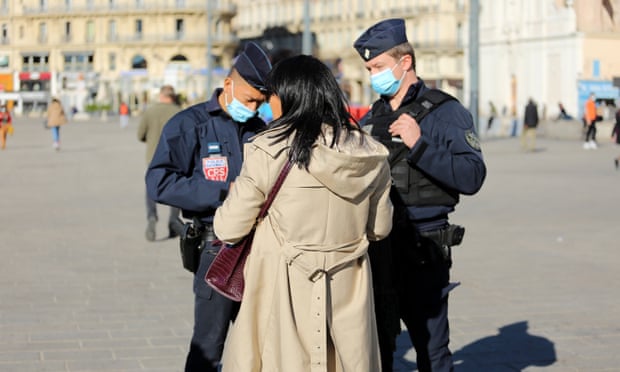
Police patrol the old port area in Marseille last week. The easing of France’s lockdown may begin this weekend.
France has announced a limited easing of its strict nationwide lockdown and Germany and Spain have outlined restrictions on Christmas and new year gatherings as European governments act to prevent Covid cases multiplying over the holiday period.
The announcements came as the second wave of the pandemic continued to cause daily death tolls not seen in the worst hit countries since the spring: Spain recorded 537 new deaths on Tuesday and Italy a further 853, its highest daily toll since the end of March.
Germany’s 16 federal states are likely to approve gatherings of a maximum of 10 people during the festive season, according to a draft proposal due to be discussed on Wednesday by state premiers and the country’s chancellor, Angela Merkel.
The mayor of Berlin, Michael Müller, said he was confident the measures would be adopted, while two state premiers said there was further broad agreement to extend a national “lockdown light” until 20 December to make family gatherings possible.
Germany closed bars, restaurants and entertainment venues for a month on 2 November, with schools and shops remaining open and private gatherings restricted to 10 people from two households.
Under the new plan, gatherings would be limited to five until the Christmas break. Big public New Year’s Eve firework displays look likely to be banned, but otherwise family celebrations should be possible “albeit on a smaller scale”, the draft said.
In France, the president, Emmanuel Macron, announced a three-stage easing of the country’s month-long lockdown, beginning this weekend with the reopening of “non-essential” businesses such as hairdressers and clothes shops, which will have to observe strict distancing rules and close at 9pm.
Churches and some cultural venues will also be able to reopen from 1 December, with a maximum of 30 visitors, Macron said in a televised address, and people would be allowed to exercise within a 20km (12-mile) radius of their homes and for up to three hours, rather than the current 1km, one-hour limits.
Providing infection numbers have fallen to about 5,000 a day, lockdown will be formally lifted on 15 December, allowing holiday travel, Macron said – although a nationwide 9pm-7am curfew would be in force except on 24 and 31 December, and all private festive gatherings would be expected to observe strict distancing rules.
“We have to do everything in our power to avoid a third wave and a third lockdown,” Macron said. “You must play a central role in this. I appeal to the responsibility and the discipline of each and every one of you.”
A third stage would begin from 20 January, Macron said, when restaurants should be able to reopen. He did not say when cafes and bars might follow suit.
The Spanish government is planning to limit festive gatherings to six people and to set a 1am to 6am curfew for Christmas Eve and New Year’s Eve, according to a leaked document seen by Spanish newspapers.
“With respect to family gatherings, we recommend they be limited to members of the same household. Should there be an external guest who does not usually live with the family, gatherings should include a maximum of six people and preventive measures must be followed,” the draft says.
Spain, under a state of emergency since late October, is hoping to have what the government called a “very substantial part” of the population vaccinated against the coronavirus by the end of March 2021.
Its health minister, Salvador Illa, outlined the government’s plans for the first round of vaccinations on Tuesday, saying the first people to get the vaccine would be care home residents and staff, health workers, and those with serious disabilities. The government hopes to vaccinate 2.5 million people in those categories between January and the end of March next year.
The Finnish capital, Helsinki, meanwhile, is introducing tough new restrictions after a sharp rise in the number of coronavirus cases, with high schools, libraries and swimming pools to be closed and public events banned outright.
“We propose to use the full range of measures within the city’s powers,” said Helsinki’s mayor, Jan Vapaavuori, warning that healthcare and contact-tracing services were at risk of being overwhelmed and too many people were ignoring recommendations.
The Finnish prime minister, Sanna Marin, warned on Monday that a new state of emergency could be declared if regional measures proved ineffective. Nationwide, Finland’s infection rate remains the lowest in the EU, with 69 new cases per 100,000 people over the last fortnight, but in the Helsinki area it has risen to 159 per 100,000.
In Sweden, whose light-touch anti-lockdown approach has attracted international attention, the country’s health watchdog criticised “serious shortcomings” in nursing homes, which account for nearly half of Sweden’s 6,400 Covid-19 deaths.
The prime minister, Stefan Löfven, admitted in May that the country had failed to protect its elderly, and the watchdog said none of Sweden’s 21 regions had taken sufficient responsibility for the treatment of infected care home residents, with a fifth of patients having received no individual assessment by doctors.
Russia’s deputy prime minister, Tatiana Golikova, said on Tuesday the country’s coronavirus situation was becoming “more complicated” with the onset of autumn and winter. Russia recorded a record 25,173 new daily infections on Monday.
Retrieved from: https://www.theguardian.com/world/2020/nov/24/france-to-ease-covid-lockdown-with-europe-wary-of-festive-surge
· Germany’s 16 federal states are likely to approve gatherings of a maximum of 10 people during the festive season, according to a draft proposal due to be discussed on Wednesday by state premiers and the country’s chancellor, Angela Merkel.
The mayor of Berlin, Michael Müller, said he was confident the measures would be adopted, while two state premiers said there was further broad agreement to extend a national “lockdown light” until 20 December to make family gatherings possible.
· In France, president Emmanuel Macron announced a three-stage easing of the country’s month-long lockdown, beginning this weekend with the reopening of “non-essential” businesses such as hairdressers and clothes shops, which will have to observe strict distancing rules and close at 9pm.
Churches and some cultural venues will also be able to reopen from 1 December, with a maximum of 30 visitors, and people would be allowed to exercise within a 20km (12-mile) radius of their homes and for up to three hours, rather than the current 1km, one-hour limits.
Providing infection numbers have fallen to about 5,000 a day, lockdown will be formally lifted on 15 December, allowing holiday travel, Macron said – although a nationwide 9pm-7am curfew would be in force except on 24 and 31 December, and all private festive gatherings would be expected to observe strict distancing rules.
A third stage would begin from 20 January, Macron said, when bars, restaurants and clubs should be able to reopen.
· In the UK, families will be able to gather in three-household groups of any size over Christmas, bringing warnings from scientists that the plan will almost inevitably see a rise in the number of coronavirus cases. Ministers said the “Christmas bubbles” would require people to make a “personal judgment” over risk for older relatives and others. The new rules will allow people to travel around freely from 23 to 27 December, irrespective of what local tier of Covid restrictions they live in. The relaxation ends on 28 December, and all areas will immediately revert to their previous Covid rules, including over new year.
· The Spanish government is planning to limit festive gatherings to six people and to set a 1am to 6am curfew for Christmas Eve and New Year’s Eve, according to a leaked document seen by Spanish newspapers. “With respect to family gatherings, we recommend they be limited to members of the same household. Should there be an external guest who does not usually live with the family, gatherings should include a maximum of six people and preventive measures must be followed,” the draft says.
· The Finnish capital, Helsinki, meanwhile, is introducing tough new restrictions after a sharp rise in the number of coronavirus cases, with high schools, libraries and swimming pools to be closed and public events banned outright. The Finnish prime minister, Sanna Marin, warned on Monday that a new state of emergency could be declared if regional measures proved ineffective.
· In Sweden, whose light-touch anti-lockdown approach has attracted international attention, the country’s health watchdog criticised “serious shortcomings” in nursing homes, which account for nearly half of Sweden’s 6,400 Covid-19 deaths.
· Russia’s deputy prime minister, Tatiana Golikova, said on Tuesday the country’s coronavirus situation was becoming “more complicated” with the onset of autumn and winter. Russia recorded a record 25,173 new daily infections on Monday.